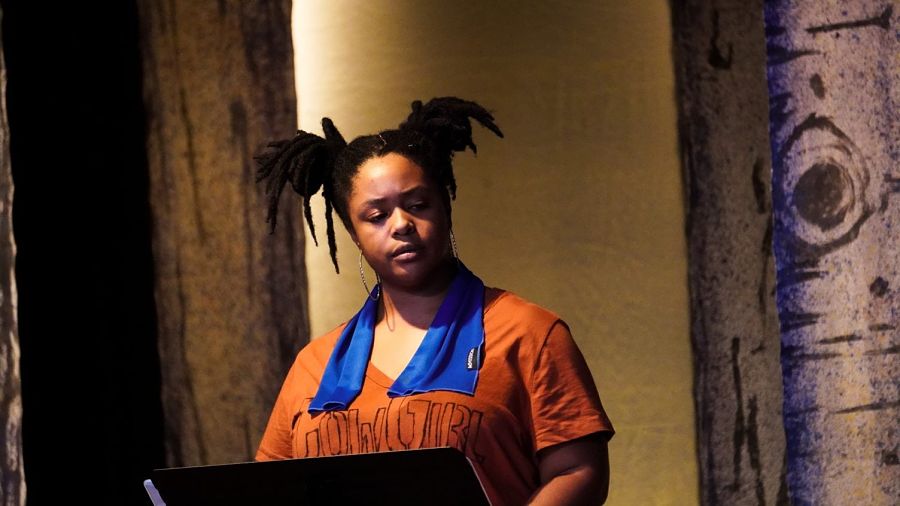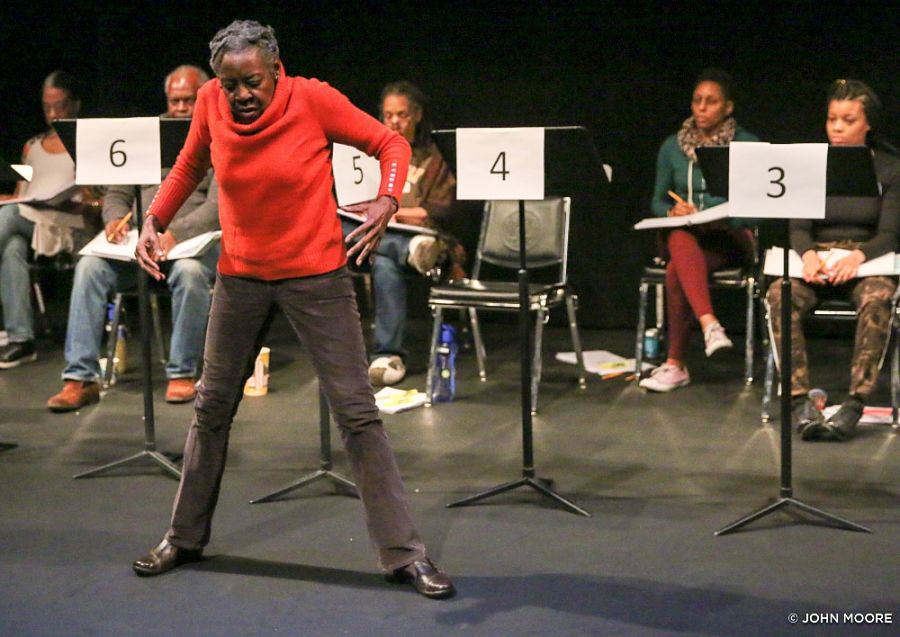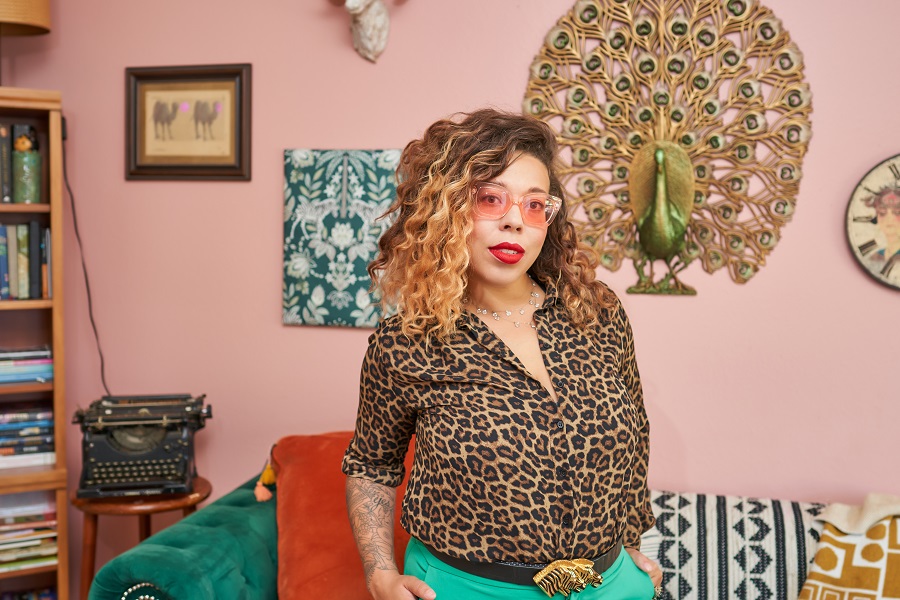“Even in my darkest times personally and professionally, I’m always ‘the show must go on’—every single time,” said playwright Beaufield Berry (she/her). “Nothing will ever keep me down for good. People have tried. My boundaries are stronger now.”
After two years of pandemic postponements and rewrites, this perseverance seems to be paying off: Her Black family comedy, In the Upper Room, will have its world premiere at the Denver Center for the Performing Arts Feb. 18-Mar. 13, and a workshop production of Buffalo Women, her Black cowgirl musical, starts in late May at the Bluebarn Theatre in Omaha, Neb., which Berry calls home.
She workshopped In the Upper Room, a 2019 Colorado New Play Summit selection, in Denver with dramaturg Jacqueline Lawton and Los Angeles-based director Gregg Daniel. The play’s intimate portrait of a diverse, multigenerational family living under one roof mirrors the experiences and personalities of Berry’s own extended clan. Said Daniel, who is returning to direct the full production, “One of the strongest points of the play for me is its family secrets—how all families keep secrets.”
Indeed, Berry said she purposely set out not to depict a generic Black experience but instead to represent the quirks, detours, and complexities of her own family.
“Something so important to me is the multitude of the Black experience—it’s not a monolith,” Berry said. “It’s important having just as many Black families be seen onstage in all of their glory and trauma as we have white families to look at. I want as many families by Black writers presented onstage in all of these variations so that we can have all these different references of what a Black family looks like.”
The play ended up in the Summit on the recommendation of its late literary manager, Doug Langworthy—and not a minute too soon. The opportunity came just as a discouraged Berry was ready to give up writing. “I was literally on a call about a new career when Doug beeped in and said my play had been selected,” Berry recalled. “It changed my life.”
Unbeknownst to Berry, dramaturg Heather Helinsky had submitted the piece to the Summit. “Doug said, ‘This is something we should think about,’” recalled DCPA Theatre Company artistic director Chris Coleman, who called In the Upper Room “a big, human-centered American family drama.”
Added Berry, who hopes the play joins the canon of American family plays, “The thing I love about my family and about this show—it’s just us being ourselves, with traditions and generations meeting in one home, the things we learn from each other and the things we do to hurt each other when we don’t mean to.”

Berry long ago abandoned acting for writing, charting the latter career without benefit of a degree. Her love of language and imagination goes back to her childhood, when she was busy reading books, penning stories, and performing onstage.
The Denver production will have barely wrapped when Berry turns her attention to Buffalo Women in Omaha. The idea for the show was sparked when she read historical accounts of Black women in the West. She’s authored the book and lyrics, and J. Isaiah Smith has written music and additional lyrics, with the two meeting often over Zoom in the past two years. In addition to the Bluebarn workshop, two venues in Des Moines (Pyramid Theatre Company, in collaboration with the Des Moines Playhouse) and one in Kansas City (The Black Box) are also producing the show, with separate casts and crews, all in commemoration of Juneteenth. Berry has connections to those cities, and is as happy about the network she’s formed as her work itself. “It’s important that in telling these big stories in big ways we’re creating a beautiful coalition of storytellers, with women leading the way,” she said.
“I had already been writing before I got into theatre,” she said. “The writing part felt so natural—it felt like breathing. I cannot not write.”
After being homeschooled with her brother by their photographer-mixed media artist single mom, she struck out on her own at an early age, living an unsettled life and getting stuck in a cycle of abusive relationships. She knows firsthand the sting of misogyny, oppression, exclusion, and poverty. Eventually she found stability and support in her husband, Rob Fisher, of whom she said, “It had to be a secure man who is my biggest champion or no man at all.”
In addition to writing for the stage, Berry has directed and produced. In Omaha, she co-founded the Firebelly Rep theatre company. She’s moved on from early efforts like Psycho Ex-Girlfriend, Happy Hour, and The Waiting Line to more mature, personal work.
As with all show business stories, Berry’s emergence this year didn’t happen overnight. The stage reading of In the Upper Room at the Summit generated enough buzz that it got slated for a 2021 mounting before the pandemic scuttled those plans until this winter. This wasn’t the first attention the play had garnered: It was read at the 2017 Great Plains Theatre Conference (now Great Plains Theatre Commons) in Omaha, and was a finalist at the 2018 Eugene O’Neill Theater’s National Playwrights Conference. GPTC plans on staging the work in 2022.
And she was hardly idle during the pandemic, authoring the virtual work, One More Chair, for Omaha’s Tri-Faith Initiative, in summer 2020. Berry’s links to her hometown scene are strong: In 2019 the Blue Barn commissioned Red Summer, which deals with the Great Migration and anti-Black riots of 1919; the play got an extended run. Buffalo Women marks her second Bluebarn project. She’s independently fundraising and producing its pre-show workshop process, and hopes to share what she’s learning with fellow creative folks and to open doors for other Nebraska artists via the inroads she’s made. “Bringing that experience back home is important to me,” she said. “Creating spaces for mothers in theatre to continue working is important for me.”

Family looms as large in her work, as do her local connections. In 2020 she founded Village Co-Op, a home school. “I am mother to my children and my art,” she said. “Every day, I choose this labor.”
Indeed, she said that she might not have written In the Upper Room, which explores the family she grew up with, if she hadn’t started a family of her own. Her “awakening” to plumbing the depths of her history and heritage, she said, “really came with me having children. It is the circle of life. I was always averse to the advice, ‘Write what you know,’ and I realized it’s because I wasn’t appreciating what I knew. I would try to write these far-out tales completely outside my realm of experience without realizing the honeypot of things I have right here at home. When I really opened the doors to myself and to my family and started peeling back those layers, I found a wealth of things that connect me to my family’s past and present and to other families.”
Indeed, the way she tells it, she wasn’t exactly the one who opened those doors.

“I can’t say it was a specific choice for me to begin that journey into writing about our family, because I did not choose it, it chose me,” she said. “I remember the nights I was writing it so vividly, where I’d keep going into a scene and I’d feel like a tap on my shoulder: Uh uh, nope, rewrite. One hundred pages I wrote in three days.”
She feels the play has remained largely intact because her ancestors were her guidestones.
“I was never alone in that room while I was writing. I don’t care how crazy it sounds to people who haven’t experienced it, because I know people who have experienced it will recognize it. The reality is, my family came back and visited and led me to write this play.”
Her domineering grandmother Rose is the matriarchal wheel around which it all turns. “Rose is a mystery in the play because she’s a mystery to me,” said Berry. “I grew up with all these stories of her as this bigger-than-life person. The way she inserted herself in people’s lives, even posthumously, the way she still shows up in people’s lives makes her immortal to me.”
As full as her vision was, Daniel, Lawton, and the actors urged Berry to go deeper.
“My collaborators wanted me to break all that down,” she said. “They wanted to know what makes her mysterious. Where I only had questions, they pushed me to find the answers. I started answering all the questions they posed to me. That led to a stronger show and a stronger writer.”
The experience of workshopping the play, most recently in Los Angeles, also led her to more fully embrace the collective that is theatre.
“As a younger writer I thought writing was a lonely machine fueled by heartbreak, whiskey, and cigarettes,” she said. “But truly, like so many other truths in life, it takes a village. It passes through hands and hearts—and everyone leaves their mark. It’s living, breathing, and growing with every incarnation. My unsolicited writing advice: Never strive to be the smartest person in a room; never think you know it all; let your work breathe life into people, and they will breathe life into your work.”
An aunt and a cousin of the playwright, both professional actors in L.A., were cast in the workshop process to help flesh out this family saga. “It’s so fun to see Berrys play Berrys,” she said. “And they’re good! I told them they don’t get cast just because they’re family.”
In the Upper Room is the first in a planned set of plays, The Tree Cycle, about the Berrys. As her appreciation for family has grown, any cynicism about its purchase in her life has vanished.
“What I have come to believe is an everlasting love,” she said. “That everlasting love is naming my youngest son, Oscar, after my great-grandpop. That love, that impact he made, will never be taken away. Eternal love is the old recipe in someone’s handwriting. That’s what my family has given to me, and I feel like that’s what I’ve given them back by immortalizing them in words.”
Leo Adam Biga (he/him) is an Omaha-based freelance writer and the author of the 2016 book Alexander Payne: His Journey in Film.


